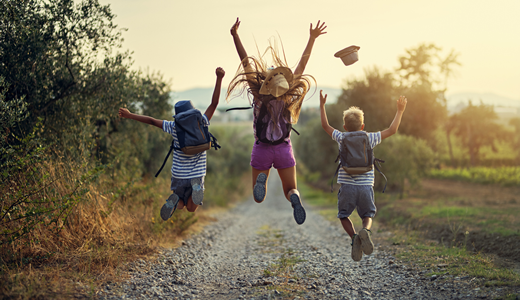It’s a generational rite of passage for oldsters to begin stories with the line, “When I was your age … ” When we’re young, we roll our eyes. And then one day, we do it ourselves.
Consider yourselves warned.
OK, I’m not that old. But—here it is—when I was my now-12-year-old son’s age in the early 1980s, life in the summer looked pretty different. I’d take off on my bike for the swimming pool with my best friend around noon or so. We’d swim for a couple of hours, maybe go for an adventurous ride in the mildly wooded outskirts of our small Midwestern town. Then we’d head downtown to the newspaper office to get our papers to deliver, spend a couple hours delivering them, then head back to the pool until it closed at 9 p.m. Then ride home. I was out of pocket, out of communication and ranging freely around town for nine or 10 hours a day, every summer day. No one thought anything of it. If I had to get in touch with my parents, there was a payphone at the pool.
I had no way of knowing how glorious those meandering, carefree days of my early adolescence really were. Nor could I know that just a decade or so later, the remarkable technological changes wrought by the internet would also begin to reshape childhood as we know it. The unfettered, free-range roaming experience that I enjoyed would soon be virtually extinct.
Not only is the idea of turning our kids lose to play somewhere in the neighborhood for hours on end an alien thing now. In many, if not most places, parents could likely be arrested for such perceived delinquency. But the fact is, few of us would want to raise our kids like that anymore. Would I ever let my children roam around their neighborhood by themselves? I’ll barely let them play unsupervised in the front yard. What if someone kidnaps them? we might say. It’s a dangerous world, and we have to be careful. We have to be safe.
That perceived “safety” comes in the form of fences. Of “playdates” (I never had a “playdate” growing up. I just played with my neighbor friends.) Of hovering, helicopter-ish parenting, lest anyone get hurt or do something unsafe. And, increasingly, it’s meant forgoing spending time outdoors at all. We’ve collectively exchanged it for sedentary iterations of screen time, whether it’s watching some form of TV, playing video games, or engaging in all manner of online and social media activities.
Ironically, though technology gives us easy access to a world of ideas—indeed, most of the ideas that humanity’s ever had—it has simultaneously circumscribed our children’s worlds, cutting them off from the sort of carefree roaming that characterized my long ‘n’ lazy summers growing up.
Those trends are exactly what New York Times contributor Kim Brooks unpacked in her recent op/ed, “We Have Ruined Childhood.” Brooks, a mother herself, notes, “Children today are more depressed than they were during the Great Depression and more anxious than they were at the height of the Cold War.” She then adds, “For a long time, as a mother and as a writer, I searched for a single culprit. Was it the screens? The food? The lack of fresh air and free time, the rise of the overscheduled, overprotected child, the overarching culture of anxiety and fear?”
Brooks suggests that our entire cultural paradigm for childrearing has changed:
I’ve come to believe that the problems with children’s mental and emotional health are caused not by any single change in kids’ environment but by a fundamental shift in the way we view children and child-rearing, and the way this shift has transformed our schools, our neighborhoods and our relationships to one another and our communities.
She notes how school stress, focus on achievement and activity, overwhelmed and overworked parents, concerns for physical safety and the rise of omnipresent screens have all played a role in isolating children and limiting their ability to play, explore and related to other children freely.
Regarding the role of technology, she says,
Many parents and pediatricians speculate about the role that screen time and social media might play in this social deficit. But it’s important to acknowledge that simply taking away or limiting screens is not enough. Children turn to screens because opportunities for real-life human interaction have vanished; the public places and spaces where kids used to learn to be people have been decimated or deemed too dangerous for those under 18.
I think Brooks is right. Clearly, we have legitimate and important concerns to be addressed with regard to screen time habits and addictions, which Plugged In has often talked about. But those issues must also be dealt with in a bigger context—one in which we’re striving to create spaces for kids to be kids again; spaces where open-ended play, relationships and curiosity can be indulged freely and free from anxiety.






Recent Comments